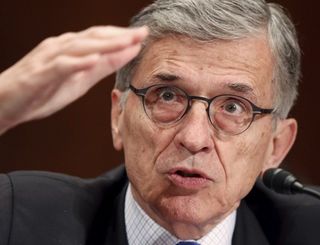Wheeler: FTC, AGs Say They Can Enforce Set-Top Privacy

FCC chairman Tom Wheeler said the Federal Trade Commission and more than a dozen state attorneys general have told the FCC that if it requires competitive device and app makers to commit to the same privacy protections as MVPDs in its proposed “unlock the box” set-top plan—something the item proposes—they would be able to enforce those just as they enforce other commitments for apps and devices.
The FCC’s Democratic majority voted earlier this year to tentatively require MVPDs to make their content and data streams available to third party set-top box makers and app developers in an effort to comply with a congressional mandate that there be a competitive market for set-tops—currently, 99% are leased from a cable or satellite company.
That assurance of privacy enforcement came in a letter to Sen. Charles Grassley (R-Iowa), chairman of the Senate Judiciary Committee, among dozens of Wheeler responses to Hill inquiries the FCC has just published on its website.
In response to legislators who had asked for the FCC to extend the comment period on the proposal, Wheeler told Rep. Darrell Issa (R-Calif.) that with the hundreds of thousands of comments submitted on his proposal to "unlock" set-tops, he is confident it will be the "most extensive examination of the subject ever undertaken."
The FCC wound up extending the comment period by a week to May 23.
Wheeler pointed out in his letter that even after the comment period has closed, the FCC continues to accept comments anyway, including any studies, and continues to talk with stakeholders.
FCC staffers are currently talking to stakeholders about a proposed "ditch the box" app-based compromise, for example, a point Wheeler made in the letter to Grassley.
Broadcasting & Cable Newsletter
The smarter way to stay on top of broadcasting and cable industry. Sign up below
"FCC staff is actively engaged in constructive conversations with all stakeholders-content creators, minority and independent programmers, public interest and consumer groups, device manufacturers and app developers, software security developers, and pay-TV providers of all sizes-on how to ensure that consumers have the competition and choice they deserve," he said. "I am hopeful that these discussions will yield straight-forward, feasible and effective rules for all."
Grassley is also concerned about copyright protections, as are content providers, but Wheeler assured him copyrights would not be compromised. "All of the current players in the content distribution stream, including cable and satellite companies, set-top box manufacturers, app developers, and subscribers, are required to respect the exclusive rights of copyright holders," he said. "The rulemaking will require any companies that enter this market subsequent to our action to follow the same requirements."
Wheeler likened content owners fears about content protection to the reluctance to allow home taping back in the VCR days.
"While many people feared that the Sony Betamax would harm the ability of content owners to earn money through films and television," he said, "it actually created a brand new and profitable market—the videocassette and later the DVD market—for content owners."
Contributing editor John Eggerton has been an editor and/or writer on media regulation, legislation and policy for over four decades, including covering the FCC, FTC, Congress, the major media trade associations, and the federal courts. In addition to Multichannel News and Broadcasting + Cable, his work has appeared in Radio World, TV Technology, TV Fax, This Week in Consumer Electronics, Variety and the Encyclopedia Britannica.

